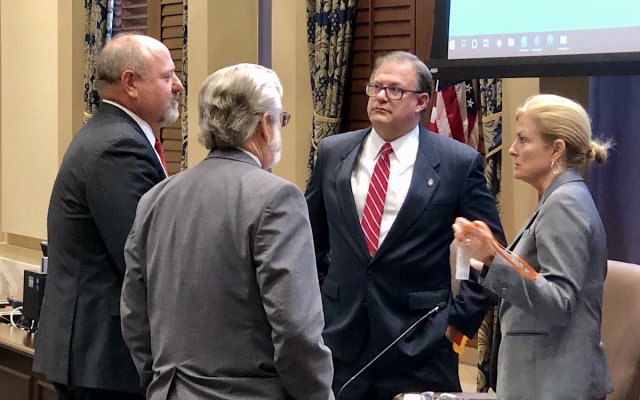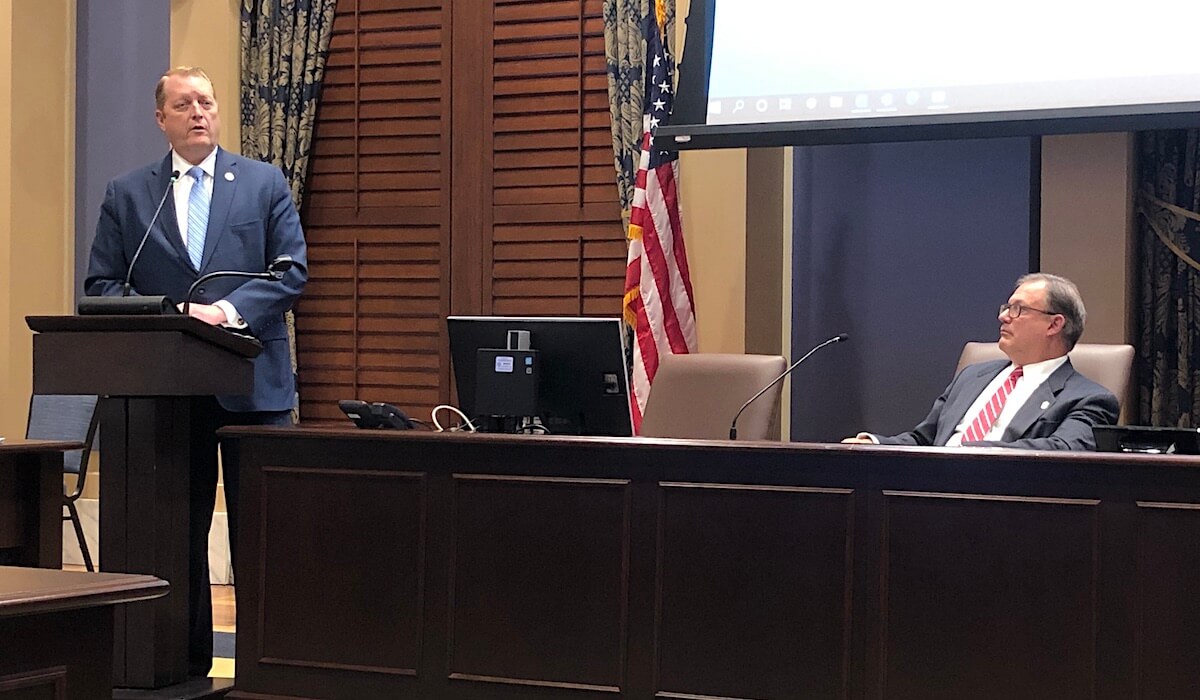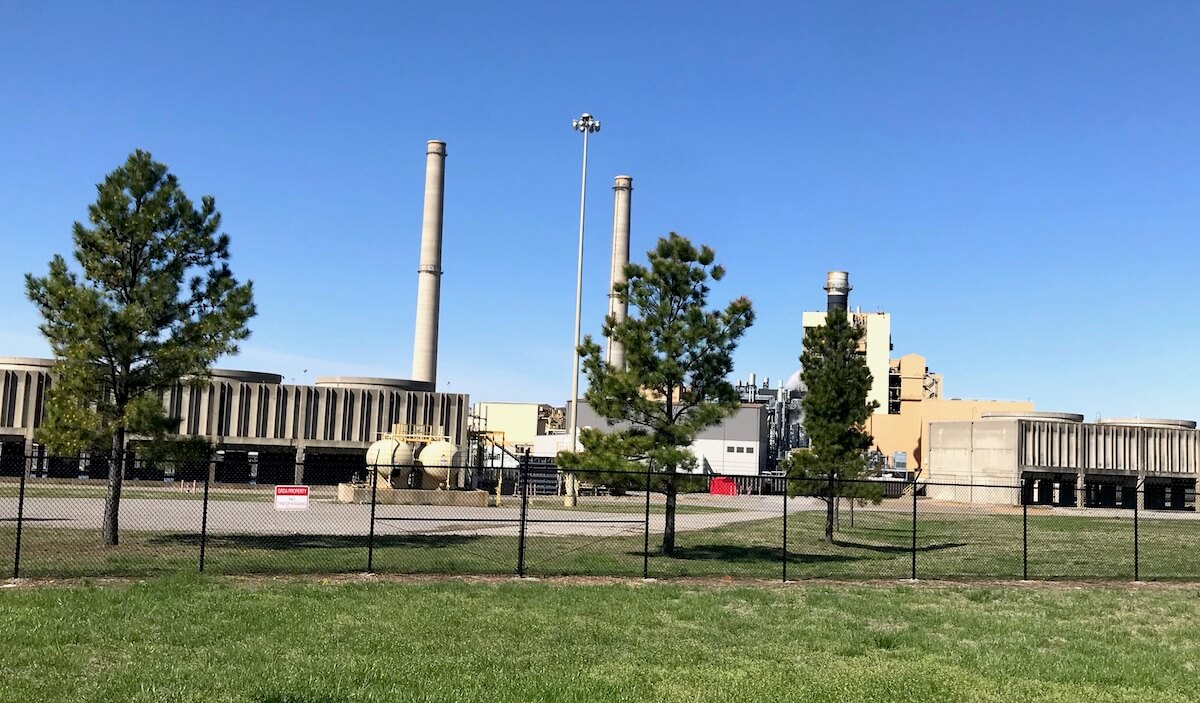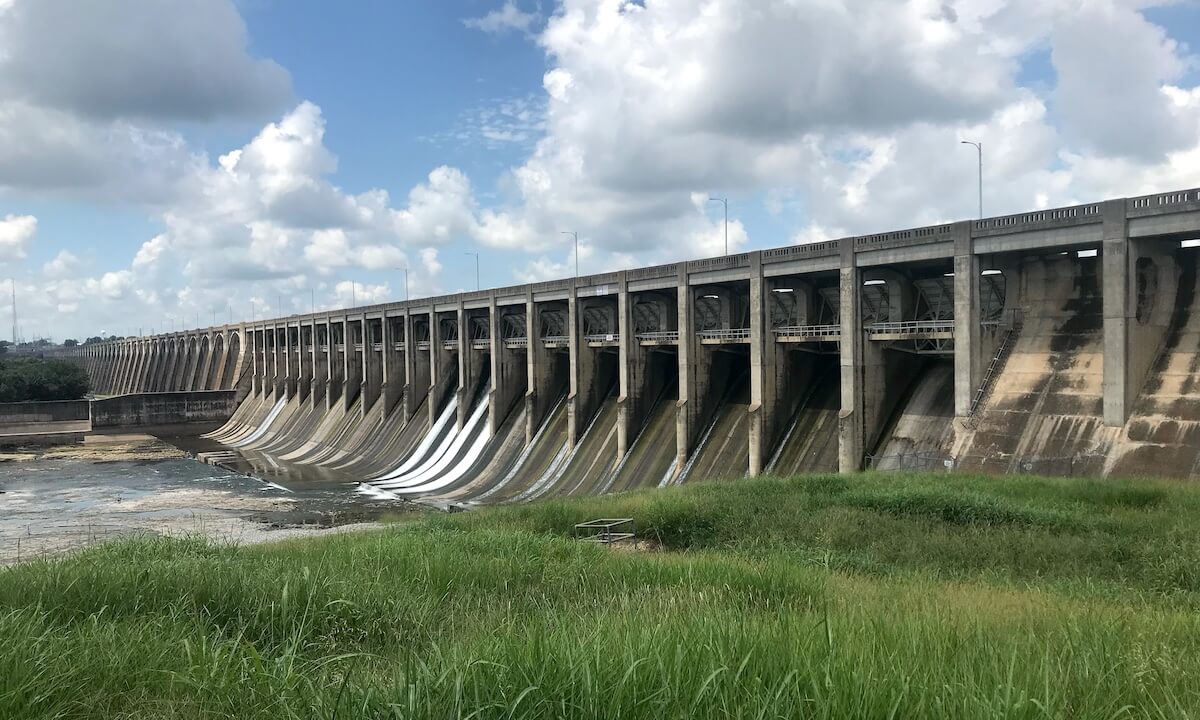

After an hour and 40 minutes of tense questions and answers and a soliloquy from Grand River Damn Authority CEO Dan Sullivan criticizing a “false narrative” pushed by for-profit electric companies, Rep. Josh West grabbed a microphone and proclaimed, “I’d like to make a motion that we vote on this today.”
Two senators instantaneously shouted, “Second!”
Moments later, the Joint Legislative Task Force on the Grand River Dam Authority voted 7-2 to recommend that the full Oklahoma Legislature approve a long-sought increase in the non-appropriated public power utility’s bonding capacity, from $1.41 billion to $2.8 billion.
After that vote, House Appropriations and Budget Chairman Kevin Wallace (R-Wellston) made a motion to recommend that the Legislature require GRDA to contribute to the state’s General Revenue Fund “a percentage of all retail sales and out-of-state (wholesale electricity) sales at a rate of 2 percent” on all current and future contracts. The vote failed 4-5.
Wallace then made a motion to recommend GRDA contribute “1 percent” on all of its electricity sales, a motion that failed 2-7. Senate Appropriations and Budget Chairman Roger Thompson (R-Okemah) then made a motion to adjourn, which Wallace moved to table. After a lengthy rules discussion among staff, the GRDA task force voted on the motion to adjourn, which holds precedence.
The adjournment motion failed 4-5, which let Wallace make another motion regarding GRDA paying into the the General Revenue Fund. Wallace moved to recommend that all future sales for new customers — retail or wholesale — result in a 2 percent contribution into the state General Revenue Fund.
“I’m hearing the word ‘contribution,’ but I’m feeling the word ‘tax,'” Thompson grumbled.
Wallace said the GRF deposit “would come off of the profits that are being generated for GRDA.”
Multiple lawmakers noted that GRDA is a nonprofit entity, though Wallace’s line of questioning earlier in the meeting revealed it to be a financially lucrative one. (Sullivan earns a $330,000 salary, more than twice the pay of Oklahoma’s governor.)
Wallace’s final motion also failed 4-5.
Sen. Michael Bergstrom (R-Adair) then made a motion to recommend lifting the 1998 moratorium that functionally prevents additional municipalities from contracting with GRDA to buy wholesale electricity, which they then sell to local customers as a revenue source for their town or city.
West (R-Grove) and Rep. Kyle Hilbert (R-Depew) both seconded Bergstrom’s motion, but Thompson said the controversial topic had only been briefly mentioned during the day’s two-hour meeting.
“To have that motion thrust upon us at this hour without any discussion I think is unfair,” Thompson said. “If we want to set a date for that discussion, then we ought to do it.”
Bergstrom ultimately agreed with his budget chairman and withdrew his motion. The task force then adjourned.
“There is the noise of democracy,” Sullivan said afterward. “We appreciate the opportunity to make our presentation and answer questions. We wanted to do this in the most efficient way we can to reach many members to help dispel some of the things that are out there.”
Asked if Thursday’s memorable meeting was an example of efficiency, Sullivan said, “Actually it is.”
“It’s hard to get that many members together and talk about (something) and ask questions so you don’t have to repeat. Democracy is not the most efficient way to do business, but it is the most effective in the end,” Sullivan said. “Now there will be more discussion about what the bill looks like and the method to get there.”
‘That is certainly a business advantage’

In terms of GRDA’s legislative goals, “getting there” will still be a long and uncertain process. The state’s largest for-profit power providers — OG&E and Public Service Company of Oklahoma (PSO) — have been lobbying lawmakers to oppose the GRDA bonding capacity increase on the basis that a state agency should not compete with private sector companies that pay significant property taxes on their transmission lines, substations and power plants.
OG&E and PSO’s positions are supported by the Alliance for Secure Energy, whose director attended Thursday’s meeting and poked at Sullivan’s lengthy presentation afterward.
“He outlined the benefits of how a state agency doesn’t have to pay taxes, and that is certainly a business advantage,” said Jeff Cloud, a former Corporation Commission member who previously lobbied for OG&E.
While questioning Sullivan, Wallace explained some of his heartburn about how GRDA sells low-cost power to the MidAmerica Industrial Park in Pryor, where many businesses avoid paying property taxes owing to the state’s controversial manufacturing tax incentive. Wallace has previously called the program — in which the state pays a qualifying company’s local property tax bill — “corporate county welfare.”
Thursday, Wallace said Oklahoma “cut a check” totaling $112 million last year.
“For the area that is out there in Pryor, Mayes County, receiving $44 million of the $112 million that we wrote a check for, it really is causing an imbalance,” he said.
That imbalance was the motivation for Wallace’s motions to make GRDA contribute to the state’s General Revenue Fund, which he insists the agency agreed to do in 2017 in a House bill that received 75 votes.
“You really do have two end users,” Wallace told Sullivan. “One that is purchasing retail (electricity for) industrial, corporate production. The other is a wholesale (electricity purchase) on the municipal side that turns around and resells to their customer base.”
In Oklahoma, towns and cities are statutorily limited in how they can raise revenue to pay for municipal services. They can levy sales taxes (but not property taxes), and they can earn revenue by providing utility services, such as electricity.
To Wallace’s statement, GRDA sells power to 15 municipal power authorities and more than 80 industrial operations, including Google at the MidAmerica Industrial Park in Pryor.
Sullivan praised the benefits GRDA provides for its municipal clients — which include Claremore, Tahlequah, Wagner and Stillwater — and called much of the criticism of his agency’s bond capacity increase request “a false narrative” borne by the for-profit utility companies.
“We do not need the Corporation Commission to protect our customers against us. The same cannot be said of others,” said Sullivan, a former legislator who took over the GRDA in 2011. “The profit utilities go to the Corporation Commission and get a guaranteed rate of return. We do not do that. We are a nonprofit organization. We do not have shareholders, we have stakeholders, and those stakeholders are our customers.”
Background on GRDA bonding proposal

Sullivan said his agency has been requesting a bonding capacity increase for five years. Last year, the Senate Appropriations and Budget Committee voted down a bill carried by Senate Floor Leader Kim David (R-Porter) by an 8-14 vote. David was named co-chairperson of the joint task force this year.
RELATED
$1.4 billion question: An obscure task force ponders hiking GRDA bonding capacity by Tres Savage
Created in 1935 by the Oklahoma Legislature, the Grand River Dam Authority operates three hydroelectric power plants, a natural gas power plant and a coal-fired power plant. The agency also holds power-purchase agreements from four private wind farms.
GRDA’s executive vice president for strategic communications, John Wiscaver, said his agency has about $1 billion in outstanding bonds, which means it has about $400 million available in its current bonding capacity.
(Correction: This article was updated at 6:40 p.m. Thursday, April 29, to correct a typo regarding the amount of GRDA’s outstanding bonds.)





















